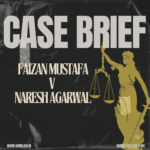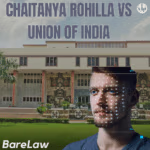Case Brief on
Rai Sahib Ram Jawaya Kapur & Ors v. State of Punjab (1955) 2 SCR 225
PRIMARY DETAILS OF THE CASE:

Case Brief on Rai Sahib Ram Jawaya Kapur & Ors v. the State of Punjab (1955) 2 SCR 225
Introduction:
None of these rights are unlimited in nature. This is not only for the people who are ruled but also for the ruling class such as officials and governments as well. Its purpose is to avoid any arbitrary actions while dispensing justice. Similarly, article 19 (1) (g) of Indian Constitution also subject to 19(2) restrictions. And it is also provided that whenever there arises a question relating to public welfare or interest, interpreting the subject matter in question will tend to bring back just a little private right. The government was alleged to have violated one such private right herein but nevertheless, the court decided otherwise and dismissed the case. Let us now look at a brief on Rai Sahib Ram Jawaya Kapur & Ors v. State of Punjab (1955).
Facts of the case:
In this instance, under the name “Uttar Chand Kapur and Sons,” petitioner along with five others was engaged in business producing, publishing and merchandising textbooks meant for different school levels particularly those pertaining to primary schools through secondary classes within Punjab state. It is done legally and it conforms to their citizens’ right of doing trade and commerce by themselves as they wish. It was widely reported that Education Department under state government of Punjab had come up with policy on nationalization this trade involving sale, publication and printing books were published though separate notifications issued for this purpose since then about them by businessmen concerned became known publicly after around one month from when it happened even though all other interested parties including authors knew nothing about all that decision before its securing through this process Tools like computers have become vital in both learning institutions as well as industries especially in modern times when technology has dominated every sector globally largely due to globalisation which makes everything go digital at once.The petitioners have therefore filed an application under Article 32(Indian Constitution) alleging that nationalizing publications and printings made out of books would violate their right to trade and business in terms of Article 19(1) (g) of the constitution and had driven them out of this business. To them, this is a policy made without proper legislation since there are no such legislative backings for such a policy but mere notifications not conforming to the requirements under Article 19(6) will render it invalid and unconstitutional because such restrictions have been placed on them. Consequently, they prayed the court for an order of mandamus restraining the state government from proceeding with these notifications.
Issues:
Are the said notifications violative of Petitioners’ Fundamental rights under Article 19 (1) (g) of Indian Constitution or not?
Do these require any legislation in place or is that necessary as per article 19(6)?
Laws involved:
Article 19(1) (g) – Right to practice any profession or to carry on any occupation, trade or business by its citizens.
Article 19(6) – Nothing in sub-clause (g) of the article 19 (1) shall affect the operation of any existing law in so far as it imposes, or prevent the State from making any law imposing, in the interests of the general public, reasonable restrictions on the exercise of the right conferred by the said sub-clause (g), or preventthe State from makingany law relatingto,
(ii) The carrying on bythe State,orbya corporation ownedor controlled bythe Stateofany trade,business, industryorservice,eitherin exclusion entireied citizens
Contentions:
There are three major issues raised by the petitioners in this case:
Firstly, it was argued that there is no legal provision for state governments to engage in trade or business activities. The petitioner also pointed out that their policy of monopolizing the trade and business of books publication and printing activity is illegal and has no authority to do so.
Secondly, it was also submitted by the petitioners that if the government wants to establish a monopoly, then such a policy can only be made after passing an act through Parliament for that purpose, which must satisfy the requirements contained under article 19(6) of Indian constitution.
They contended that if the government had not legislated for any payment of compensation as demanded by article 31 of Indian constitution then it should not have deprived them from their rights and interests as they were under obligation to compensate them.
Decision:
The court observed and held as follows.
Firstly, on whether there was violation of fundamental rights of the petitioners through act by state government – Court repudiated petitioner’s claim that there was violation of fundamental rights under Article 19(1) (g). It pointed out that when it comes to school books, it is schools who suggest kind of books but publishers cannot demand students or school for acceptance of their books as textbooks. It stated clearly that whenever a trader makes good sales in trade he gets customers whereas; when he loses any such trade he cannot say his or her right to have customers has been violated. Henceforth its position is specified stating thus chances are chance incident to each business and no such fundamental right exists at this particular time.
Lastly, With respect to second issue, court firstly explained about articles 73 and 162 nd section 23 which deals with executive powers as well limits parliament and state power execution respectively. Thereby court viewed it as though a modern state has responsibility towards all welfare activities required for citizens within its territory. Furthermore in order for any particular trade or business to be carried on, there has also to be specific legislation for special need of power beyond the one given in terms executive by law. In that case special enactment will breach privacy rights or otherwise. Now that the issue as to whether there was violation of fundamental rights of petitioners failed, It does not matter whether government could have powers to create a monopoly without law under article 19(6) of the constitution too.
Supreme Court dismissed the petition accordingly [34].



